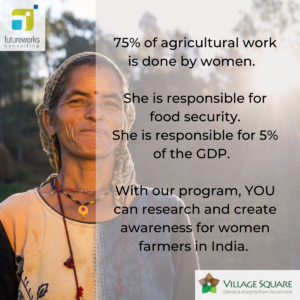
26th June 2023 was the first day of the Emerging India Research Program (EIRP). We have a diverse cohort with 22 students, from grades 9-12 in different schools such as Dhirubhai Ambani International School, Step by Step, American School of Dubai, Vidya Gyan, Vasant Valley, Shri Ram and many more. We had four sessions with industry experts, on public health, agriculture, and research and data.
We had an interesting conversation with Krishnan Pallassana, about #climate change, #agriculture and #intersectionality.
Did you know that 75% of agricultural work is done by women? Yet when asked about farmers, most of us would conjure up images of a man working the field… Surprisingly they own only 12.8% of agricultural land.
#Women in agriculture bear a massive burden for and because of our society. They shoulder the responsibility for #food security and contribute 5% to the total GDP for agriculture. Due to the combination of the gender divide and the impact of climate change on agriculture, women farmers are becoming more and more vulnerable.
Students could research the systems sustaining these disparities, how and why their work goes unrecognized, and how the law can protect women in agriculture.
The Emerging India Research Program trains students to write well-researched, thought-provoking pieces on relevant themes in India. This program sharpens critical thinking and research skills and moulds students into thoughtful, well-informed adults.
We are excited to see their insights on intersectionality, agriculture and climate change!

